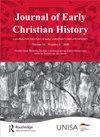Parrēsia beyond Humankind? Exploring the Representation of the Voice of Creation in the Epistle to the Romans
IF 0.1
0 RELIGION
引用次数: 0
Abstract
AbstractIn this article, the notion of parrēsia, freedom of speech, is explored with regard to the voice of (non-human) nature in Paul’s Epistle to the Romans. Instances from chs. 1, 8, and 11 of this letter are discussed in interaction with both the broader discourse on parrēsia and the newer approach of “wild pedagogies” that focuses on allowing nature to speak for itself. The exegetical findings are sobering, as it becomes clear that Paul’s appeals to what can be conceptualised as the “voice of nature” in his letter are to be seen as his representation and rhetorical use of this voice primarily. This result can also serve as a reminder to be careful within the fields of eco-theology and eco-hermeneutics when it comes to appealing to the voice of nature without considering that it is often humans speaking for nature, rather than nature speaking for itself.Keywords: ecologyEpistle to the RomanshermeneuticsnatureparrēsiaPaulwild pedagogiesParrēsia超越人类?探索《致罗马人书信》中创造之声的表现
摘要本文从保罗致罗马书中(非人类)自然的声音出发,探讨parrēsia言论自由的概念。来自chs的实例。这封信的第1、8和11条与parrēsia上更广泛的论述和“野生教育学”的新方法相互作用进行了讨论,该方法侧重于让自然为自己说话。训诂学的发现是发人深省的,因为很明显,保罗在信中对“自然之声”的呼吁,可以被视为他对这种声音的主要表现和修辞使用。这个结果也可以作为一个提醒,在生态神学和生态解释学领域,当涉及到呼吁自然的声音时,要小心,而不考虑它经常是人类为自然说话,而不是自然为自己说话。关键词:生态学,对RomanshermeneuticsnatureparrēsiaPaulwild教学法
本文章由计算机程序翻译,如有差异,请以英文原文为准。
求助全文
约1分钟内获得全文
求助全文

 求助内容:
求助内容: 应助结果提醒方式:
应助结果提醒方式:


